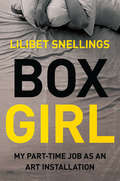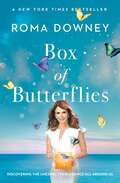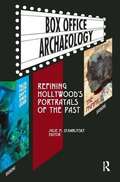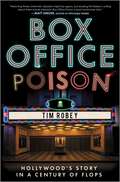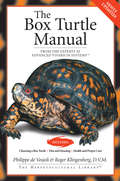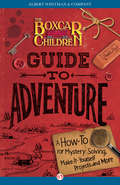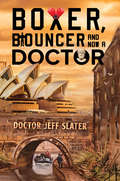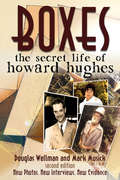- Table View
- List View
Box - Flecha do Cupido - Primeira Geração
by Ligia Fonseca Melissa StormJames Morgan nunca acreditou muito no amor – até ver Deborah Walker pela primeira vez na lanchonete local. Ele se surpreende ao convidá-la para sair, e ela o choca ainda mais ao aceitar. Durante o encontro, os dois compartilham suas histórias e sonhos secretos, e James percebe que ela é a mulher perfeita. O único problema é que ele embarcará para a Coreia na manhã seguinte. Cumprir seu dever é crucial para James, mesmo que lutar por seu país acabe deixando ambos de coração partido. Deborah promete esperar por ele, mas dois anos são muito tempo para parar sua vida, especialmente por um homem que só conheceu por um dia. Quando Rip Rockwell volta da guerra e James não, Rip pede Deborah em casamento. Ela aceita e eles constroem uma bela vida juntos até a morte dele, 50 anos depois. Durante todo esse tempo, entretanto, ela nunca conseguiu realmente esquecer seu primeiro amor. Deborah se aposenta e muda para Abeline, esperando viver o resto de seus dias em paz. Imagine sua surpresa quando James Morgan se muda para a casa ao lado… Ambos têm uma vida cheia de amor. Ambos perdem a pessoa amada cedo demais. Será que James e Deborah conseguirão formar uma nova vida juntos enquanto acalentam a lembrança daqueles que ainda vivem em seus corações? Este box set especial inclui: Meu Coração É Só Seu, a agridoce história de amor entre Deborah e Rip Nunca Vou Deixar de Te Amar, a história de amor predestinada entre James e Gloria Quando Me Apaixonar e Você Me Faz Sentir Tão Jovem, contos já publicados sobre James e Deborah Olhe para Casa, Anjo, um novo conto sobre a nova vida de Rip e Deborah no Alasca Só Preciso Sonhar, um novo conto sobre a nova vida de James e Gloria como pais Uma árvore genealógica e uma lista com sugestão de ordem de leitura para todas as três séries Flecha do Cupido Um prefácio da autora discorrendo sobre sua ligação pessoal com os personagens e as ambientações. �
Box Girl: My Part-Time Job as an Art Installation
by Lilibet SnellingsWhen 22-year-old Lilibet Snellings moved to Los Angeles on a whim, she unintentionally became a "slash" to keep her head above water-a writer/waitress/actress/Box Girl. One night each week, Lilibet would go to The Standard Hotel in West Hollywood, don a pair of white boy shorts with a matching tank, touch up her lip gloss, and crawl into a giant glass case behind the front desk. There, she could do whatever she wanted-check email, catch up on reading, even sleep-as long as she ignored the many hotel guests who would point and ask the staff, "Is she allowed to use the bathroom?" (Yes.)Dog-paddling through her twenties, Snellings resisted financial bailouts (for the most part) from her sweet Southern mother and business-oriented dad, while pondering her peculiar position as a human art installation. Was she a piece of art or a piece of ass? Was she allowed to read both Walt Whitman and US Weekly as she lounged in an oversized, waterless aquarium behind a hotel concierge desk? From misinterpreting a modeling agency interview as a talent audition, to avoiding Bond-girl-style deaths at New Year's Eve parties, Snellings shares and laughs at her many mishaps while living in LA.
BOX handleiding: Lexicaal Semantische Afasietherapie
by Evy Visch-BrinkBOX is een therapieprogramma voor de behandeling van lexicaal-semantische stoornissen. Deze stoornissen komen frequent voor bij afasiepatiënten, onafhankelijk van het type afasie. De patiënt kent woordbetekenissen niet of niet volledig. 'Tram’ wordt bijvoorbeeld opgevat als ‘bus’ of in plaats van ‘lepel’ zegt men ‘vork’. Bij een ernstige lexicaal-semantische stoornis wijken de fouten nog meer af van het doelwoord. Ook komt het voor dat de patiënt niets zegt of de specifieke inhoudswoorden omzeilt door generalisaties (‘dingen’, ‘doen’ etc.). Het niet of gedeeltelijk onderkennen van woordbetekenis beïnvloedt het begrip en de productie van geschreven en gesproken taal.BOX bestaat uit 8 onderdelen: semantische categorieën, semantische gradiënt, syntagmatische en paradigmatische relaties, deel-geheel relaties, bijvoeglijke naamwoorden en uitroepen, semantische anomalieën, semantische definities en semantische context.In ieder onderdeel zijn twee of drie moeilijkheidsgraden verwerkt. De oefeningen worden in geschreven woorden aangeboden. De patiënt kan het antwoord zeggen en/of aanwijzen. BOX bestaat uit meer dan 1000 oefeningen en kan gebruikt worden voor minimaal 60 uur therapie.
Box of Butterflies: Discovering the Unexpected Blessings All Around Us
by Roma DowneyA NEW YORK TIMES BESTSELLER Roma Downey—best known as the beloved angel on the TV show Touched by an Angel—&“has created a beautiful and personal testimony to the presence of God in our lives and our world&” (Most Reverend José H. Gomez, Archbishop of Los Angeles).Ever since she was a little girl, Roma has seen butterflies as a reminder of God&’s presence. They have appeared to her in moments when she needed encouragement, reminding her that she is not alone. In this deeply personal book, Roma shares stories from her life, alongside quotes, poems, scripture, and artwork that she prays will uplift you as they have her. Reminiscent of the message of her popular television series, Touched by an Angel, this book&’s central theme is that there is a God, He loves you, and that even in your most difficult moments, He is by your side. The subtle butterfly theme reminds us that the wonder of God&’s love and kindness is sometimes reflected in the gentle whispers of His creation and that we all have the power to transform from simple caterpillars into exquisite butterflies. This inspirational book invites you to return to its pages again and again, as life brings new challenges, or you find yourself in need of new inspiration. Box of Butterflies &“will touch you and move you and strengthen you&” (Kathie Lee Gifford).
Box Office Archaeology: Refining Hollywood's Portrayals of the Past
by Julie M. SchablitskyUniversity of Oregon-based archaeologist Schablitsky presents readers interested in film, archaeology, and history with this comparison between Hollywood portrayals of historical peoples and the reality as determined by archaeologists. Thirteen chapters take on the big screen's portrayal of Pocahontas and other American Indians, early Chinatowns, the Civil War submarine, the African American experience, the Titanic, pirates, mummies, and the Old West. The methodology for the archaeological assessment of film fiction is also described. Annotation ©2008 Book News, Inc., Portland, OR (booknews.com)
Box Office Archaeology: Refining Hollywood’s Portrayals of the Past
by Julie M. Schablitsky“How true is it?” is a common refrain of patrons coming out of movie theatres after the latest film on pirates, Vikings, or mummies. While Hollywood usurps the past for its own entertainment purposes, archaeologists and historians know a lot about many of these subjects, digging up stories often more fascinating than the ones projected on screen. This distinguished group of archaeologists select key subjects and genres used by Hollywood and provide the historical and archaeological depth that a movie cannot—what really happened in history. Topics include Egypt, the Wild West, Civil War submarines, Vikings, the Titanic, and others. The book should be of interest to introductory archaeology and American history classes, courses on film and popular culture, and to a general audience. Alternate Selection, History Book Club.
Box Office Poison: Hollywood's Story in a Century of Flops
by Tim Robey***A NEXT BIG IDEA CLUB MUST-READ BOOK OF NOVEMBER 2024***"A wild success." — Publishers Weekly"A surefire hit." —Library Journal STARRED review"A brilliant star turn." —Andrew O&’HaganA riotous and revealing story of Hollywood&’s most spectacular flops and how they ended careers, bankrupted studios and changed film history."Failure fascinates, for all the reasons that success is a drag…&”From grand follies to misunderstood masterpieces, disastrous sequels to catastrophic literary adaptations, Box Office Poison tells a hugely entertaining alternative history of Hollywood, through a century of its most notable flops. What can these films tell us about the Hollywood system, the public&’s appetite–or lack of it–and the circumstances that saw such flops actually made? Away from the canon, this is the definitive take on these ill-fated, but essential celluloid failures.Robey covers a vast century of flops, including: Intolerance; Queen Kelly; Freaks; Sylvia Scarlett; The Magnificent Ambersons; Land of the Pharoahs; Doctor Dolittle; Sorcerer; Dune; The Adventures of Baron Munchausen; Nothing But Trouble; The Hudsucker Proxy; Cutthroat Island; Speed 2: Cruise Control; Babe: Pig in the City; Supernova; Rollerball; The Adventures of Pluto Nash; Gigli; Alexander; Catwoman; A Sound of Thunder; Speed Racer; Synecdoche, New York; Pan; and Cats.From Daily Telegraph film critic Tim Robey, this is a brilliantly fun exploration of human nature and stupidity in some of the greatest film flops throughout history.
Box to Box: From the Premier League to British Boxing Champion
by Curtis WoodhouseThe football world is filled with stories of talented young footballers who have thrown it all away before drifting into obscurity. Similarly, the tale of an ageing boxer who won the title against the odds is so familiar it has become a cliche. But put the two stories together and you've got something special: wasted footballers simply don't become boxing champions - at least they didn't before Curtis Woodhouse. Woodhouse had been destined for greatness. At the age of 17 he made his debut for his local club, Sheffield United, and quickly went from earning £42 a week to £4000 a week. Suddenly he felt like a rock star, and began living like one - which didn't help his football. Initially, there wasn't a problem, and he earned four England Under-21 caps, playing alongside the likes of Steven Gerrard and Frank Lampard. As his drinking increased and he began getting involved in fights, he was sold to Birmingham City at 20 and saw his wages double - but so did his problems. After a brawl, he was sentenced to 250 hours' community service, and when he finally reached the Premier League he ended up playing against Liverpool while still drunk. He'd fallen out of love with the game. After another transfer, manager Barry Fry suggested he take up boxing to provide an outlet for his anger, and a new passion was born. While still playing football, he became determined to make it as a boxer, and endured a long, hard battle to develop the skills to give him a chance, and in September 2006 he made his professional debut. With his father on his deathbed, Woodhouse made a promise: he would win a British title. On 22 February 2014, he got his chance against Darren Hamilton - 'I knew I wouldn't lose.' Packed with brilliant stories and searingly honest insight, Box to Box shows how anyone can achieve their dreams - if they work hard enough.
The Box Turtle Manual
by Philippe De Vosjoli Roger J. KlingenbergThe Box Turtle Manual seeks to "help prospective owners keep their turtles healthy and happy." Given the low price tag placed on a box turtle in a pet shop, many casual shoppers add a box turtle to their household without preparation or knowledge about how to keep the animal alive. Since quality information is difficult to find on box turtles, Philippe de Vosjoli and Dr. Roger Klingenberger remedy the situation with this Advanced Vivarium Systems edition dedicated to box turtles. The authors believe that these popular and beautiful turtles...."may teach you one or two lessons about the delicate balance of life, natural law, and the many ways in which intelligence in manifested in nature." The book presents background information and guidelines for caring for a box turtle, including selecting a health specimen, acclimating the turtle, indoor and outdoor housing, heating and lighting requirements, feeding and handling, hibernation and breeding. The authors recommend three specific species of box turtles as good pet candidates: they provide photos and information on ornate box turtles, common Asian box turtles, and Chinese box turtles. Dr. Klingenberger provides a chapter on diseases and disorders that gives specific advice about dealing with dehydration, nutritional problems, parasitic problems, and vitamin deficiency. A five-page troubleshooting chart for health problems concludes the chapter. Resources and index included.
Box Turtles and Other Pond and Marsh Turtles (World Book's Animals of the World)
by Christina JohnsonIntroduces the box turtle and talks about keeping one as a pet.
The Box Wine Sailors: Misadventures of a Broke Young Couple at Sea
by Amy McculloughThe true story of a young couple who quit their jobs and set sail for a year on the ocean with no boating experienceAmy and Jimmie were not sailors and their experience on the seas included reading a few books, watching a couple of instructional videos, and boating once a week each year. They were middle-class land-lubbers, audacious and in love, and all they wanted was to be together and do something extraordinary. The Box Wine Sailors tells the true story of a couple's ramshackle trip down the coast with all the exulting highs and terrifying lows of sailing a small boat on the Pacific. From sailing on Thanksgiving morning under spectacular bright blue Californian skies just off the Channel Islands as dolphins raced alongside their boat to the terrifying experience of rounding Punta Gorda and hanging on to the mast for dear life. It also tells the story of two very normal people doing what most people only dream of and settling the argument that if you want something bad enough you can make it happen.
Box2D for Flash Games
by Emanuele FeronatoThis book is a step by step guide to create games with Box2D explained in a simple and friendly way. Are you familiar with ActionScript3 and want to explore the capabilities of physics in game design using Box2D, then this book is for you. You don't have to be an AS3 hero: if you know how to create classes and functions with AS3, then you can make your first physics game!
The Boxcar Children Guide to Adventure
by Gertrude Chandler Warner The Boxcar ChildrenThe Boxcar Children have long been known for being creative and resourceful. This hardcover book is filled with fun how-to guides for everyday adventures. It includes tips and tricks for mystery solving (how to make invisible ink and create secret codes), travel (how to pack a suitcase; how to take great snapshots), and enjoying the great outdoors. Each of the four Boxcar Children has his or her own section--practical advice from Jessie, a "roughing it" guide from Henry, crafts and art projects from Violet, and recipes from Benny! A great gift for Boxcar fans.
Boxer
by Dog Fancy MagazineSmart Owners Guide: Boxer is the first interactive breed book of it kind to offer new and novice owners a fun new way to learn about caring for their loyal companions. Boxer offers the most up-to-date online support with instant access to Club BoxerTM where owners can meet and interact with other dedicated owners, download charts and checklists, play Boxer-specific games, take quizzes, and send Boxer themed e-cards. The book contains easy-to-read, informative content, with addition smart tips, notable quotations, fun facts, and more than 100 adorable breed photos that keep you flipping through the pages.
Boxer
by William ScolnikThis Comprehensive Owner's Guide to the Boxer serves as a complete introduction to this handsome German breed that has become one of the world's most cherished companions and most relied-upon working dogs. The loyal and friendly Boxer is impossible to beat for affection, elegance, and the sheer "paws-on" fun! Owners will read about how the Boxer was invented in Germany and the important people and dogs who put the canine pugilist on the map-from Frau Stockmann and Bang Away to the modern-day movers and shakers in England, America, Canada, and beyond.The history chapter is followed by a chapter devoted to the characteristics of this exceptional working breed, offering sound advice about which owners are best suited to this vigorous and active canine.New owners will welcome the well-prepared chapter on finding a breeder and selecting a healthy, sound puppy. Chapters on puppy-proofing the home and yard, purchasing the right supplies for the puppy as well as house-training, feeding, and grooming are illustrated with handsome adults and puppies bursting with energy and personality! In all, there are over 135 photographs in this useful and reliable volume. The author's advice on obedience training will help the reader better mold and train into the brightest and most well-mannered dog in the neighborhood. The extensive chapter on healthcare provides up-to-date detailed information on selecting a qualified veterinarian, vaccinations, preventing and dealing with parasites, infectious diseases, and more. Sidebars throughout the text offer helpful hints, covering topics as diverse as historical kennels, toxic plants, first aid, crate training, carsickness, fussy eaters, and parasite control. Fully indexed.
The Boxer and the Goalkeeper: Sartre vs. Camus
by Andy MartinJean-Paul Sartre is the author of possibly the most notorious one-liner of twentieth-century philosophy: 'Hell is other people'. Albert Camus was The Outsider. The two men first came together in Occupied Paris in the middle of the Second World War, and quickly became friends, comrades, and mutual admirers.
Boxer, Bouncer and Now a Doctor
by Doctor Jeff SlaterIt all started in a small industrial town in the north of England. Walking into a boxing gym was the start of an amazing metamorphosis for the 14-year-old. At age 20, he had developed into a 16-stone boxer, powerlifter and ferocious street fighter, with a knock-out punch in both hands. This is the story of a young man who, lacking education, immigrated to Australia at just 18 years of age only to experience the twilight world of sleaze and violence in Perth’s underbelly, confronting and often overcoming the many challenges he encountered. Returning to England at 21, he mastered his craft as a bouncer and street fighter, attended two universities, obtained three degrees and was awarded a doctorate at the age of 39.
The Boxer (Learning About Dogs)
by Charlotte WilcoxLearn about the boxer, its breeding, history and personality in this high interest book.
Boxers: Everything about Purchase, Care, Feeding, Breeding, and Training
by Herta E. Kraupa-TuskanyAn expert answers all your questions about boxer care: feeding, behavior, health, breeding and much more. Up-to-date and informative, yet clear enough for young pet owners.
Boxers Are the Best! (The Best Dogs Ever)
by Elaine LandauWhat's that dog with the short coat, square build, and seemingly boundless energy? It's the boxer! Boxers are kind hearted dogs with keen intelligence and playful spirits. Their owners think they are the best dogs ever--and it's easy to see why. If you're a boxer fan, you'll want to learn all about this breed, from its loyal personality and strong physique to its history as a herding dog in Germany. You'll also want to find out how to care for the boxer. So check out this go-to guide for boxer lovers--and learn all about why boxers are the best breed there is!
The Boxer's Heart: A Woman Fighting
by Kate Sekules&“Brave and ballsy . . . the internal chaos that prompts Sekules&’ rage and desire to retaliate is a more original, fascinating place to visit than any gym.&” —Salon.com The Boxer&’s Heart is a brilliantly candid memoir of the world of women&’s boxing, now updated and with a new afterword. Written in raw and vivid style, it tells the story of how a young everywoman moves to New York City to write and, through struggles and disappointments in her personal life, rises through the ranks at the famed Gleason&’s Gym to box professionally. Sekules&’s account unfolds with the pace and depth of a great novel, crammed with larger-than-life characters and piercing observations. Any woman who has grappled with anger and trust in her relationships, been nagged by insecurity at the gym, or wondered what it feels like to throw a punch will identify with this witty and honest account of &“ the sweet science of bruising.&” &“It&’s a knockout, folks . . . The Boxer&’s Heart is a winner, on all cards.&” —Newsweek &“What is most captivating about Sekules&’ love letter to boxing is how she reconciles the feminine proclivity for tenderness and nurturing with their simultaneous ability to knock one another out, to unleash fury in a controlled and respectful way.&” —Oprah.com &“Sekules . . . is appealingly self-aware . . . [and] gives us a sense of women&’s boxing as a thriving movement.&” —The New York Times Book Review &“This is a story of self-discovery, about finding out what you love, and then doing it—with passion, with a boxer&’s heart.&” —Kirkus Reviews
Boxes: Second Edition: The Secret Life Of Howard Hughes
by Douglas Wellman and Mark MusickNew witnesses have come forward with personal stories, additional evidence, and photographs. Hughes’s links to the murder of mobster Bugsy Siegel and the killers of President John F. Kennedy are revealed as well as the real identity of the long-haired crazy man that Hughes placed in the Desert Inn Hotel to distract the world while he escaped. <p><p> Eva McLelland kept her secret for thirty-one stressful years as she lived a nomadic existence with a man who refused to unpack his belongings for fear he would be discovered and have to flee. Only her husband’s death finally released her to tell the story that had been burning inside her for decades.
Boxes: The Secret Life of Howard Hughes
by Douglas WellmanEva McLelland was good at keeping secrets, and she had a big one. Sworn to secrecy for thirty-one years until the death of her husband, Eva was at last able to come forward and share a story that turns twentieth century history on its head and fills in puzzling blanks in the mysterious life of the tycoon Howard Hughes. How could Hughes appear to witnesses as an emaciated, long finger-nailed, mental incompetent, yet fly a jet aircraft four months later? How could a doctor describe him as looking like a "prisoner of war," when at the same time investment bankers, politicians, and diplomats who met him said he was articulate and well-groomed? The answer is a perfect example of the brilliance of the elusive billionaire. He simply found a mentally incompetent man to impersonate him, drawing the attention of the Internal Revenue Service and an army of lawyers who pursued him, while he conducted his business in peace from Panama with his new wife, Eva McLelland. Sound fantastic? It is. However, after seven years of research and verification, Eva's story produces the final pieces in the mysterious puzzle that was Howard Hughes.
Boxes: Second Edition
by Douglas Wellman Mark MusickThis second edition of Boxes: The Secret Life of Howard Hughes continues the history-changing story of Eva McLelland and her reclusive life married to a mystery man she discovered was Howard Hughes. New witnesses have come forward with personal stories, additional evidence, and photographs. Hughes's links to the murder of mobster Bugsy Siegel and the killers of President John F. Kennedy are revealed as well as the real identity of the long-haired crazy man that Hughes placed in the Desert Inn Hotel to distract the world while he escaped. Eva McLelland kept her secret for thirty-one stressful years as she lived a nomadic existence with a man who refused to unpack his belongings for fear he would be discovered and have to flee. Only her husband's death finally released her to tell the story that had been burning inside her for decades.

